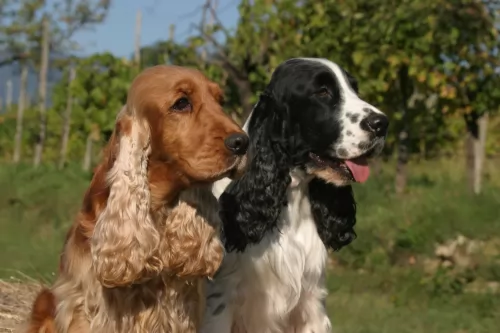 Petzlover
PetzloverAmerican Cocker Spaniel is originated from United States but Blue Paul Terrier is originated from United Kingdom. American Cocker Spaniel may grow 16 cm / 6 inches shorter than Blue Paul Terrier. American Cocker Spaniel may weigh 11 kg / 24 pounds lesser than Blue Paul Terrier. American Cocker Spaniel may live 3 years more than Blue Paul Terrier. American Cocker Spaniel may have less litter size than Blue Paul Terrier. American Cocker Spaniel requires Moderate Maintenance. But Blue Paul Terrier requires Low Maintenance
 Descended from the English Cocker Spaniel when the latter were brought to the United States in the late 1800s. American hunters wanted a smaller dog for bird hunting, so they crossed them with smaller spaniel breeds. The English and the American Cockers were considered the same breed until 1935 when the American Kennel Club officially separated them into 2 distinct breeds. After this the American Cocker’s popularity increased dramatically.
To this day they are one of the most popular breeds in the U.S. Recently their popularity has spread back to England. The American Cocker Spaniel has evolved from a hunting dog life to a very popular family pet.
Descended from the English Cocker Spaniel when the latter were brought to the United States in the late 1800s. American hunters wanted a smaller dog for bird hunting, so they crossed them with smaller spaniel breeds. The English and the American Cockers were considered the same breed until 1935 when the American Kennel Club officially separated them into 2 distinct breeds. After this the American Cocker’s popularity increased dramatically.
To this day they are one of the most popular breeds in the U.S. Recently their popularity has spread back to England. The American Cocker Spaniel has evolved from a hunting dog life to a very popular family pet.
Known also as the Scottish Bull Terrier, the Blue Poll or the Blue Poll Bulldog, the Blue Paul Terrier’s origins, as with many unusual dog breeds, are still not known precisely. However they do appear to have been bred with Staffies at some point and appear to have slowly transformed into the Staffie or Pit Bull as we know them today.
There doesn’t seem to be much documentation on the dog’s origins, making many stories of its origins to be looked upon as folklore. It seems as if the dog originated out of Scotland. The name ‘Paul’ is included in the name simply because it is believed that John Paul Jones, who was a sailor, brought the dog to the USA in 1777.
Because this dog has superb fighting skills, it was introduced as part of Staffordshire Bull Terrier breeding in the early 19th century. It is believed that the first dogs came with English immigrants to the United Stated in the middle of the 19th century. At some time, the dog became extinct, but dates of this time can’t be established.
 The American Cocker spaniel is a sturdy dog of medium size. The have a rounded head with a broad and deep muzzle. The jaw is even and square while the teeth have a scissors bite. The American Cocker has round eyes that are almost always dark with the exception of the Merle who can have blue colored eyes. They have long ears and a docked tail in the U.S. Docking is illegal in most of Europe. The American Cocker bred for field hunts have shorter coats than those bred for show. Grooming is essential for this longhaired breed. It is especially important for the eyes and ears to be kept clean.
The American Cocker spaniel is a sturdy dog of medium size. The have a rounded head with a broad and deep muzzle. The jaw is even and square while the teeth have a scissors bite. The American Cocker has round eyes that are almost always dark with the exception of the Merle who can have blue colored eyes. They have long ears and a docked tail in the U.S. Docking is illegal in most of Europe. The American Cocker bred for field hunts have shorter coats than those bred for show. Grooming is essential for this longhaired breed. It is especially important for the eyes and ears to be kept clean.
The Blue Paul Terrier was a smooth coated, medium sized dog. His coat was mostly dark blue but this sometimes varied to red or brindle. He was a muscled and well built dog, much like our pit bull terriers. He weighed about 20 to 25kg kg, measuring up to 56cm at the withers. He had a broad chest, large head with small cropped ears and a tail that was set low. He is a dog that always stood strongly on his legs. It seems as if he had an aggressive nature as they were used by local dog fighters.
There is not much information on the temperament of the Blue Paul Terrier, but we can assume, that because he was a Terrier, he would have been full of character and self confidence. Most Terriers don’t actively look for a fight, but will certainly get into a fight if provoked. Aggressive by nature and a fighter, the Blue Paul Terrier possibly had some Staffordshire Bull Terrier in him, so his temperament would be that of a fighter.
He may have been able to live peacefully with children and other dogs and cats in the home, but he would no doubt have had to be raised from a puppy in such a household. Stubborn and headstrong, he would require a firm owner who could take charge of him and training would have been imperative for such a dog.
 This is a gentle, happy dog. They are high energy, high spirited, friendly dogs who like people and other animals alike. They are happy to be with you and want to please you. He can find a home in the country and in the city alike. He is inquisitive and easy to train.
This is a gentle, happy dog. They are high energy, high spirited, friendly dogs who like people and other animals alike. They are happy to be with you and want to please you. He can find a home in the country and in the city alike. He is inquisitive and easy to train.
But be warned they can be stubborn and hard to housebreak. They can be shy and need a lot of socialization as a pup. They can take over a household if you are not the strong pack leader they need. They have a tendency to urinate when excited and must live inside with the family. They are far too social to be left outside. An unhappy, unstable cocker can be into resource guarding of things, spaces and people. They can bark obsessively or be hyperactive. They must have a loving home with the family.
Nobody is quite certain what the Blue Paul Terrier was like. He definitely seemed to be a mix of Pit Bull and Staffie – the same compact, muscular build with a look that speaks of confidence and boldness.
Perhaps if the Blue Paul Terrier wasn’t used for fighting, he might well have made a good pet with training and socialization. Nobody really knows. Maybe he was so aggressive that when dog fighting didn’t work out, and it was discovered that he wasn't really pet-material, nobody bothered when the breed went into extinction. That's the thing with Blue Paul Terriers, nobody is really certain about what they were really like.
 Perhaps the least of the American Cocker Spaniel’s health concerns are the tendency to overeat and become obese. The more serious concerns include glaucoma, cataracts, dysplasia, allergies, Cherry eye, lip fold pyoderma, liver disease, cardiomyopathy, and congestive heart failure (CHF).
Perhaps the least of the American Cocker Spaniel’s health concerns are the tendency to overeat and become obese. The more serious concerns include glaucoma, cataracts, dysplasia, allergies, Cherry eye, lip fold pyoderma, liver disease, cardiomyopathy, and congestive heart failure (CHF).
The most serious health issue the breed faces is IMHA or Immune Mediated Hemolytic Anemia which can be deadly. In fact, it is almost always fatal and comes on quickly. With this condition the dog can bleed out internally and there is little that veterinary medicine can do.
The Blue Paul Terrier Health was generally a healthy dog, but he would no doubt have had the same common dog ailments that most dog breeds have to contend with. All those years ago, when the Blue Paul Terrier was ill, his owner no doubt would have taken him to see the veterinarian for a full screening.
Just like with other dog breeds, he would have been watched for hip dysplasia , ticks and fleas, cataracts and skin infections. It is possible that in those days, owners of the Blue Paul Terrier weren’t aware of how plaque could cause dental problems or gum disease.
 The American Cocker Spaniel breed requires attention to detail and making sure your puppy gets enough and your adult doesn’t get too much. Feed the pups twice a day until they reach the age of 4 months and then cut them back to the adult dose of once a day at supper time. Feed from a cup to a cup and a half.
The American Cocker Spaniel breed requires attention to detail and making sure your puppy gets enough and your adult doesn’t get too much. Feed the pups twice a day until they reach the age of 4 months and then cut them back to the adult dose of once a day at supper time. Feed from a cup to a cup and a half.
not previously mentioned include Ectropion and Entropion, Prolapse of the nicititans gland, gastric torsion and elbow dysplasia. Have your puppy tested for eye diseases and any issues with the knee and hip. These are social dogs and will not do well alone outside. They need to live inside.
The American Cockers love to play and need a lot of exercise. Nice long walks, games of fetch or even agility will keep your Cocker happy. have plenty of stamina and need regular exercise. They also enjoy a good hunt.
Because these dogs were used in fighting, it is a breed that no doubt would have required plenty of exercise and mental stimulation to keep him fighting fit. No doubt he would have received a high quality food to build up his strength and stamina. Because he was no doubt a high energy dog, his owners would have had to give him nutritious food and ensured fresh, clean water for him.
The Blue Paul Terrier had a short, smooth coat, so they were no doubt low maintenance dogs who received a brush down every now and then to remove his loose hair.